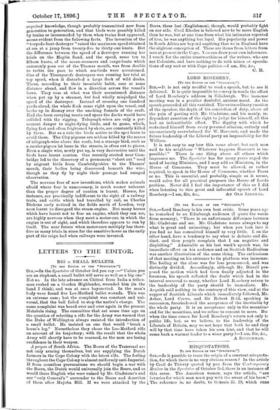[To THE EDITOR 07 THE "SPECTATOR.] SIR,—Lord Rosebery is his
own best critic. Some years ago he remarked to an Edinburgh audience (I quote the words from memory), "There is an unfortunate difference between Mr. Gladstone and me. Mr. Gladstone seems always to say what is great and animating ; but when you look into it you find he has committed himself to very little. I, on the other hand, have a tendency to say what is definite and dis- tinct, and then people complain that I am negative and dispiriting." Admirable as his last week's speech was, its immediate effect on his audience and on Scottish Radicalism was another illustration of the same thing. The enthusiasm of that meeting on his entrance to its platform was immense. The feeling at the close was far less pronounced, and was distinctly divided. Accordingly, although Mr. Birrell pro- posed the motion which had been finally adjusted in the forenoon, his speech reflected the doubt which had in the interval occurred to many, whether Lord Rosebery return to the leadership of the party should be immediate. Mr. Asquith said nothing to the contrary of this view, and at the sapper of Scottish Liberals which immediately followed, Mr. Asher, Lord Crewe, and Sir Robert Reid, speaking in succession, foreshadowed the acceptance of the inevitable by the whole party. It is an acceptance only in the meantime and for the meantime, and we refuse to consent to more. But when the time comes for Lord Rosebery's return not only tc public life, but, as we believe, to the leadership of the Liberals of Britain, may we not hope that both he and they will by that time have taken his own hint, and that he will come back a warmer leader to a wiser party P—I am, Sir, &c., A SCOTCH MAN.






































 Previous page
Previous page